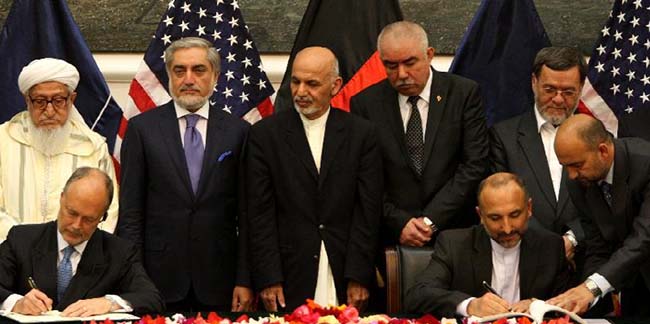A robust military partnership between the US and Afghanistan is crucial for the ongoing campaign against the Taliban insurgency. The government of Afghanistan hopes the existing security partnership agreement between Afghanistan and the United States would strengthen Afghanistan’s security and defense forces in the fight against the insurgent groups. Though playing a crucial role in training, advising and equipping Afghan National Security Forces (ANSF), the Bilateral Security Agreement (BSA) has also been criticized for failing to provide sufficient assistance to ANSF that are fighting bitter Taliban insurgency on several fronts. While critics point to the BSA’s inability to make any differences in assisting ANSF in the fight against the Taliban, Afghan authorities maintain that the pact has played an important role in strengthening ANSF.
Despite the pact ensuring continued support of the US to ANSF, the deterioration of security led to criticisms to the national unity government over its failure for using the capacities of the security pact to ensure sufficient international assistance. The criticisms forced the government to take measures for implementation of the security pact with the United States and Afghanistan introducing routine assessments for monitoring implementation of the agreement. The third round of meetings between Afghanistan and the US over implementation of the security pact was held in Kabul on Saturday attended by US Secretary of State John Kerry and Salahuddin Rabbani, Minister of Foreign Affairs of Afghanistan.
In the meeting, the two sides discussed the agreement and the situation in Afghanistan including security and counter-terrorism, democracy and governance, economic and social developments of Afghanistan. John Kerry reasserted on the US commitment to provide support to ANSF to maintain security in the country and fight the insurgent groups. According to the Afghan officials, the United States has pledged to provide more warplanes to the Afghan air force in the near future to bolster Afghanistan’s anti-insurgency campaign.
Shortly after taking over presidency, Ashraf Ghani quickly moved to sign the Kabul-Washington security agreement after former president Hamid Karzai refused to sign the agreement months after the negotiations over the pact were concluded. The Afghan government hoped the pact would prevent further deterioration of security in the country at a time when NATO was going to end its combat mission in Afghanistan and the country was experiencing excruciating political and economic challenges. But security in the country deteriorated dramatically with the Taliban coming into a resurgence and expanding their insurgency across the country including to the once relatively security northern Afghanistan. BSA, however, has not been able to prevent the Taliban from taking more grounds and expanding their insurgent activities across the country.
Though the agreement was a milestone for continued security partnership between Afghanistan and the US after withdrawal of US-led international coalition, it still had some major weaknesses. Ahead of the signing of the agreement, the US was increasingly turning exhausted with the Afghanistan mission as the war was too costly for the US and remained an open-ended conflict after fourteen years. With the American public opposing the war, the United States had chosen to hastily arrange withdrawal despite the fact that rush for exit was further emboldening the Taliban and giving them the motive to wait for the exit of the US and NATO forces by end of 2014. The hasty withdrawal approach with no doubt harmed the prospect of post-mission support for Afghanistan and the US military support to ANSF fighting a resurgent Taliban insurgency.
On the other hand, despite Afghanistan’s insistence for a clearly-defined security agreement, the agreement remained terribly flawed in defining the threats for Afghanistan that would require US cooperation and direct intervention. For instance, the two countries bitterly negotiated the terms related to definition of foreign aggressions against Afghanistan and how the US would be obliged to respond in the events of such threats to Afghanistan. This led to an agreement that is remaining vague in many areas including US role in case of continued foreign support to the Taliban and US role in case of a possible resurgence of the Taliban. The Afghan government created hurdles to a robust military partnership between the two countries by limiting the role of the US troops in aerial and night-time operations both before and after 2014.
While the Taliban quickly managing to start expanding the insurgency, the Afghan government was struggling to cope with the heightened offensives of the Taliban while the US forces stood by watching the deterioration of security and failing to organize active and large-scale air and ground support to repel the Taliban. However, the national unity government did what was needed for reversing the harms done to the security partnership between the United States and Afghanistan. After quickly signing the security agreement, the Afghan government urged the US to reconsider the plans for withdrawal of bulk of troops by end of 2016 and plan the withdrawal according to the ground situation in Afghanistan.
The security pact between Afghanistan and the US ensures long-term support to Afghanistan’s security and defense forces. The assistance mission is codenamed as the Resolute Support Mission as part of which US troops provide advising and training to ANSF and equip them. Despite the shortcomings, the security pact has a major capacity for a robust partnership between Afghanistan’s security forces and the US military. Expanding security cooperation between the two countries is vital for survival of Afghanistan and strengthening of the ANSF in the face of the resurgent Taliban. However, the Afghan government needs to make sure it is utilizing the full capacity of the agreement to boost the anti-insurgency campaign and better equip ANSF.
Home » Opinion » The BSA and Prospect of Security in Afghanistan
The BSA and Prospect of Security in Afghanistan
| Abdul Ahad Bahrami

